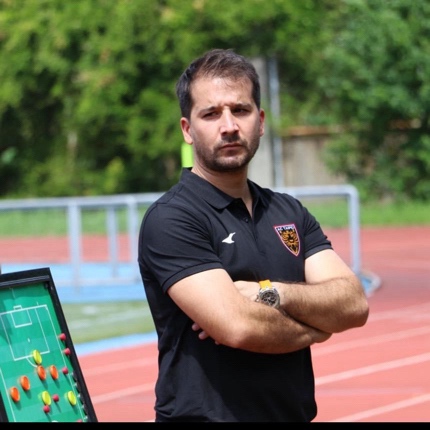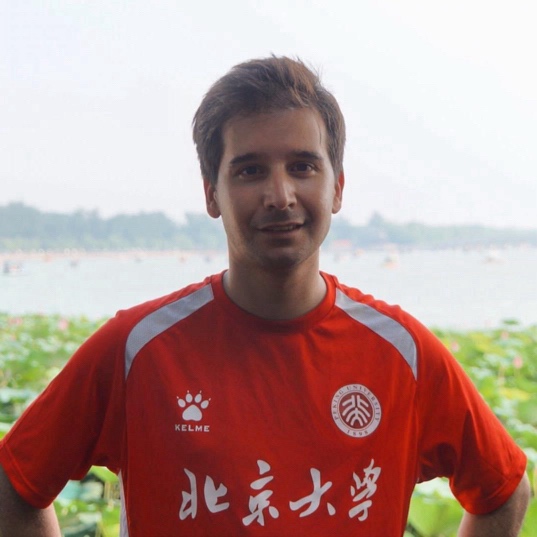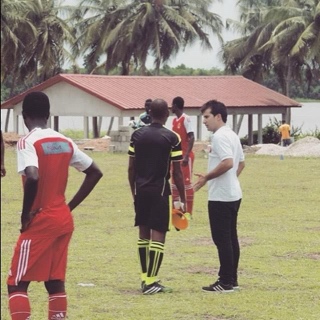Football is the ultimate global sport, and working in it offers an unparalleled opportunity to experience new places, different cultures, and contribute to the game’s growth. This interview is evidence of how a passion for football can take you across the world.
Noel Peréz began his coaching career at just 14 (!) while he was still playing. Since then, he’s coached at multiple clubs around Barcelona, earned his UEFA Pro License from the Spanish Football Association, and embarked on a globetrotting career over the past decade.
After roles in the Ivory Coast, China and Nigeria - Noel is now in his first head coaching role at a professional club - leading AC Taipei II in Taiwan's second division. Beyond coaching, Noel holds qualifications in human psychology and has even published his own memoir. In this interview, he shares key insights and fascinating anecdotes from his journey across the footballing world.
The interview has been condensed and lightly edited for grammar and clarity.

[ Background in football ]
I was a boy who started playing football very early (at the age of 4) because my father instilled it in me very intensely from the moment I started crawling. As a player, I began with my neighborhood team near Barcelona, standing out above the rest until I had the opportunity to play for RCD Espanyol of Barcelona, one of the most important youth academies in Spain, during the 1999-2000 season. After that experience, a few years later, as a post-adolescent, I had a brief experience in professional football in Israel. However, shortly after, at the age of 20, I decided to retire as a player due to physical issues, but also because I felt the need to make a shift in my professional life.
It was then that becoming a coach made a real difference in my life. I made my debut as a head coach at the age of 14 (during the 2003-2004 season), leading a U-10 team in my neighborhood. From that point on, I began to grow in this profession, overcoming countless social, intellectual, and football-related challenges, as I was still a child coaching other children. And here I am today, on the other side of the world, 20 years later, living the dream.
[ Leaving Spain & your journey up until now ]
One day, early in 2016, while I was living and working for a semi-professional club in Barcelona, I came across a peculiar job posting on a specialized forum. It was for the position of sporting director at a promising and important new academy in Ivory Coast. The listing had been up for over a month, and there were many applicants, but without high expectations, I decided to try my luck. Thanks to fate—or maybe a well-written project submitted in record time—I landed the job, marking my first international experience as a coach, or in this case, as a director.
The experience was fantastic, a whirlwind of emotions and intense adaptation. I was able to create a structured and organized approach to meet the competitive objectives set by the academy. After a year and several successes (for example, our remarkable participation in the prestigious international youth tournament MIC, where we were eliminated in the quarterfinals by FC Barcelona's U-13 team by the narrowest margin, with their coach anxiously counting down the minutes), we were the revelation of that globally renowned tournament.
Soon after, I received an offer from China to coach at the prestigious Peking University (PKU), where I stayed for nearly two years until the onset of COVID, at which point I decided to voluntarily terminate my contract. Then came an offer to work in the Inner Mongolia region, in collaboration with the government and the national football federation. Although expectations were high due to the scale of the project, it could not be fully realized because of the restrictions and obstacles caused by the pandemic.
In 2023, I decided to return home, and by that summer, I was offered a leadership role as a scout for the renowned project 'The Showcase' in Abuja, Nigeria. Shortly after, my former boss in Beijing reached out to me to lead a new elite academy in Beijing, where I remained until last September. Finally, after 20 years in my career, I’ve achieved the milestone of leading a team in a professional division, this time in Taiwan.

[ Dealing with language barriers ]
In a profession like this, the art of communication is essential for achieving an adequate level of understanding and, consequently, effectiveness. Learning English wasn’t initially a priority for me, but as I started climbing the ranks in the world of football, I eventually realized the importance of being able to speak different languages, which further enhanced my personal competencies.
English is the number one language in football across most of the planet. It’s true that the level of proficiency varies depending on the place, but here in Taiwan, it is more than acceptable. There are a few communication issues with some members of the technical staff, but with most of the players, it’s perfectly understandable and operational.
It’s important to emphasize that direct communication between the sender and the receiver should be as straightforward as possible to ensure that the message or idea transcends different contexts and cultural barriers. When translators are used, the level of effectiveness tends to decrease significantly.
[ Adjusting to new football cultures ]
Through my experiences around the world, I have come to understand the profound and close relationship between the socio-cultural context of a specific place and its footballing style. For example, in Africa, I witnessed football in its purest form—children playing in the streets, on any terrain, no matter how unsuitable it seemed, and overcoming any obstacles they faced.
In contrast, in more developed societies like those in Asia, the situation is entirely different. Many children are just beginning to get familiar with having a football at home, and there’s a significant degree of parental overprotection, much like in the West, which can hinder or slow down the technical development of a potential future star.

[ Managing AC Taipei’s 2nd/reserve team ]
Reserve teams can be a natural transition towards the senior first team as long as the internal context of the club and its structural idiosyncrasies are well understood. For example, in our club in Taiwan, having both our first and reserve teams in the top two divisions of the country allows us to identify, develop, and promote future professional players due to our clear focus on controlled progression. This demonstrates a proper balance between age and competition level, and having a second team in a professional division is the perfect springboard for these players to project themselves in the most realistic way possible.
On the other hand, there are many clubs where the only focus is on the first team as the top priority. In those cases, neglecting the club's youth base or reserve team shows a style doomed to failure if the club’s socio-economic circumstances deteriorate. In such situations, the club becomes dependent on external sources because it cannot generate its own talent pipeline from within.
Leading this team is an extremely challenging task, as competing in the second professional division of a country with a significantly younger squad than the rest presents enormous difficulties. We are the only club with a reserve team in a professional category, and our average age is under 20. The primary goal is to stay in the division using all available resources, but without losing sight of the internal priority of providing players to the first team as soon as they are ready. This makes it even harder to translate daily work into immediate performance.
The task goes beyond just football-specific coaching—it also involves crucial psychological motivation, which plays a fundamental role in finding the necessary balance in our day-to-day operations.
"having both our first and reserve teams in the top two divisions of the country allows us to identify, develop, and promote future professional players"
[ How important is networking as a coach? ]
I believe that networking in the football world is absolutely essential for any coach who wants to achieve success in the medium to long term. We mustn’t forget that, like in any business, marketing and exposure to third parties is indispensable—it’s not just about specializing in the technical aspects of the profession. There are countless examples of elite coaches who were former players and have landed major projects more because of their reputation as ex-players rather than through merit or coaching knowledge.
It's important to remember that most club executives lack deep football knowledge and will almost always prefer to bet on someone well-known or with strong connections, rather than someone with true, specific expertise in football. So, I strongly encourage any young, passionate, and hard-working coach reading these lines to dedicate part of their time to networking and projecting themselves in this world of appearances, where attitude often seems more valuable than knowledge or aptitude.
[ You recently wrote a book about your experiences in football and life? ]
After many years of experiences around the world and facing various challenges in my professional journey, I decided to take a step toward one of my deepest passions: writing. This decision did not come out of nowhere; it was inspired by the support and advice from my closest circle, who have always believed in my ability to tell stories. Throughout my life, I have accumulated a wealth of experiences and anecdotes in the fascinating world of football—an arena that has allowed me to develop not only as a professional but also as a person.
Despite my young age, I have been fortunate to live in different countries and cultures, each leaving an indelible mark on me. My narratives encompass everything from the exhilarating moments on the pitch, where adrenaline and passion intertwine, to the solitary nights spent in hotel rooms, yearning for the company of my loved ones. I often find myself reflecting on the football landscape, an industry that, while vibrant and exciting, also presents significant challenges. This book is my attempt to share those highs and lows, the lessons learned, and the realities faced by those dedicated to this sport.
One of the main themes I explore in these pages is the delicate balance between personal satisfaction and the constant pursuit of happiness. Living my dream is undoubtedly an invaluable gift, but it also comes at a cost. I have learned that every decision I make has direct consequences, not only in my career but in my personal life as well. Loneliness can be a constant companion, especially during times of transition or when expectations are high. The feeling of being far from home, unable to share my triumphs and failures with those I hold dear, can be overwhelming. However, it is often in those moments of solitude that I have found profound introspection and the opportunity to grow.
This book is not just a collection of experiences; it is a work where I bare my soul and leave nothing unsaid. Through my words, I hope to take the reader on a cosmic journey, where the passion for football intertwines with the realities of life, the sacrifices involved in pursuing a dream, and the lessons time teaches us. As I share my reflections, I also invite others to contemplate their own journeys, how each of us navigates the turbulent waters of life and sport.
"This book is my attempt to share those highs and lows, the lessons learned, and the realities faced by those dedicated to this sport"
[ Next Steps ]
The future will be of another color. That was precisely the title of the last chapter of my book, and it reflects life itself. Through my experiences in this unique lifestyle, I've learned the importance of living day by day, without having expectations that stretch beyond six months into the future. Everything can change in an instant, and a single phone call can propel me at record speed to the other side of the planet.
As of today, my dream of continuing to progress in football is incredibly strong. I remain passionate and dedicated to my career, but I also understand that nothing lasts forever. Life extends far beyond the boundaries of the football pitch. I've begun to contemplate other paths that might bring me fulfillment, such as pursuing a career in psychology or perhaps placing greater emphasis on writing. Each of these avenues holds its own appeal, and the possibility of exploring them excites me.
The reality is that the future is unpredictable, and with every passing day, I find myself more open to new opportunities. Just as in football, where strategies and plans must adapt to the game’s ever-changing dynamics, my life too requires flexibility and resilience. I have learned to embrace the uncertainty, finding comfort in the knowledge that each experience, whether joyful or challenging, contributes to my growth and understanding.
In the end, the future will indeed be of another color, a palette enriched by my experiences, passions, and aspirations. It is a reminder that life is not merely about one pursuit, but about weaving together the many threads of our interests and desires into a vibrant tapestry. I look forward to what lies ahead, ready to embrace whatever colors the future may bring.
